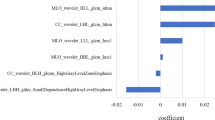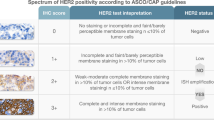Abstract
Objective
To compare the prognostic prediction between dichotomized and fractionated evaluations of hormone receptor expressions.
Methods
Patients with stages I–III breast cancers, who received adjuvant tamoxifen, were enrolled. The expression of estrogen receptor (ER) and progesterone receptor (PR) was evaluated by immunohistochemistry (IHC). A fractionated score (F score), the percentage of positive-staining nuclei (0=none, 1=1%–10%, 2=11%–30%, 3=31%–50%, 4=51%–70%, and 5=71%–100%), was assigned to each case. The dichotomized scoring method defines an F score >1 as positive. The prognostic values of both scores were compared by multiple Cox’s proportional hazard models of disease-free survival (DFS) and overall survival (OS).
Results
Four hundred and sixteen patients with a median follow-up of 78.0 months were included. F scores for ER and PR correlated directly with DFS and OS. Although both the dichotomized and fractionated ER and PR scores were significantly associated with DFS and OS in univariate analyses, only fractionated ER and PR scores remained as independent prognostic factors of DFS and OS in the final multiple Cox’s proportional hazard models.
Conclusion
Fractionated IHC hormone receptor expression evaluation enhances the prognostic prediction compared with a dichotomized assessment.
Similar content being viewed by others
References
Arpino, G., Weiss, H., Lee, A.V., Schiff, R., de Placido, S., Osborne, C.K., Elledge, R.M., 2005. Estrogen receptor-positive, progesterone receptor-negative breast cancer: association with growth factor receptor expression and tamoxifen resistance. J. Natl. Cancer Inst., 97(17):1254–1261.
Badve, S.S., Baehner, F.L., Gray, R.P., Childs, B.H., Maddala, T., Liu, M.L., Rowley, S.C., Shak, S., Perez, E.A., Shulman, L.J., et al., 2008. Estrogen- and progesterone-receptor status in ECOG 2197: comparison of immunohistochemistry by local and central laboratories and quantitative reverse transcription polymerase chain reaction by central laboratory. J. Clin. Oncol., 26(15):2473–2481. [doi:10.1200/JCO.2007.13.6424]
Banerjee, M., George, J., Song, E.Y., Roy, A., Hryniuk, W., 2004. Tree-based model for breast cancer prognostication. J. Clin. Oncol., 22(13):2567–2575. [doi:10.1200/JCO.2004.11.141]
Barnes, D.M., Harris, W.H., Smith, P., Millis, R.R., Rubens, R.D., 1996. Immunohistochemical determination of oestrogen receptor: comparison of different methods of assessment of staining and correlation with clinical outcome of breast cancer patients. Br. J. Cancer, 74(9):1445–1451.
Cianfrocca, M., Goldstein, L.J., 2004. Prognostic and predictive factors in early-stage breast cancer. Oncologist, 9(6):606–616. [doi:10.1634/theoncologist.9-6-606]
Collins, L.C., Botero, M.L., Schnitt, S.J., 2005. Bimodal frequency distribution of estrogen receptor immunohistochemical staining results in breast cancer: an analysis of 825 cases. Am. J. Clin. Pathol., 123(1):16–20. [doi:10.1309/HCF035N9WK40ETJ0]
EBCTCG (Early Breast Cancer Trialists’ Collaborative Group), 2005. Effects of chemotherapy and hormonal therapy for early breast cancer on recurrence and 15-year survival: an overview of the randomised trials. Lancet, 365(9472):1687–1717. [doi:10.1016/S0140-6736(05)665 44-0]
Elledge, R.M., Green, S., Pugh, R., Allred, D.C., Clark, G.M., Hill, J., Ravdin, P., Martino, S., Osborne, C.K., 2000. Estrogen receptor (ER) and progesterone receptor (PgR), by ligand-binding assay compared with ER, PgR and pS2, by immunohistochemistry in predicting response to tamoxifen in metastatic breast cancer: a Southwest Oncology Group Study. Int. J. Cancer, 89(2):111–117. [doi:10.1002/(SICI)1097-0215(20000320)89:2〈111::AIDIJC2〉 3.0.CO;2-W]
Ellis, M.J., Coop, A., Singh, B., Mauriac, L., Llombert-Cussac, A., Janicke, F., Miller, W.R., Evans, D.B., Dugan, M., Brady, C., Quebe-Fehling, E., Borgs, M., 2001. Letrozole is more effective neoadjuvant endocrine therapy than tamoxifen for ErbB-1- and/or ErbB-2-positive, estrogen receptor-positive primary breast cancer: evidence from a phase III randomized trial. J. Clin. Oncol., 19(18):3808–3816.
Elston, C.W., Ellis, I.O., 1991. Pathological prognostic factors in breast cancer. I. The value of histological grade in breast cancer: experience from a large study with long-term follow-up. Histopathology, 19(5):403–410. [doi:10.1111/j.1365-2559.1991.tb00229.x]
Elston, C.W., Ellis, I.O., 1998. The Breast. Churchill Livingston, Edinburgh, p.673.
Esteva, F.J., Hortobagyi, G.N., 2004. Prognostic molecular markers in early breast cancer. Breast Cancer Res., 6(3):109–118. [doi:10.1186/bcr777]
Ferrero-Pous, M., Trassard, M., Le Doussal, V., Hacene, K., Tubiana-Hulin, M., Spyratos, F., 2001. Comparison of enzyme immunoassay and immunohistochemical measurements of estrogen and progesterone receptors in breast cancer patients. Appl. Immunohistochem. Mol. Morphol., 9(3):267–275. [doi:10.1097/00022744-200109000-00012]
Harvey, J.M., Clark, G.M., Osborne, C.K., Allred, D.C., 1999. Estrogen receptor status by immunohistochemistry is superior to the ligand-binding assay for predicting response to adjuvant endocrine therapy in breast cancer. J. Clin. Oncol., 17(5):1474–1481.
Horii, R., Akiyama, F., Ito, Y., Iwase, T., 2007. Assessment of hormone receptor status in breast cancer. Pathol. Int., 57(12):784–790. [doi:10.1111/j.1440-1827.2007.02174.x]
Huang, A., Pettigrew, N.M., Watson, P.H., 1996. Immunohistochemical assay for oestrogen receptors in paraffin wax sections of breast carcinoma using a new monoclonal antibody. J. Pathol., 180(2):223–237. [doi:10.1002/(SICI) 1096-9896(199610)180:2〈223::AID-PATH635〉3.0.CO;2-H]
Huang, C.S., Kuo, S.H., Lien, H.C., Yang, S.Y., You, S.L., Shen, C.Y., Lin, C.H., Lu, Y.S., Chang, K.J., 2008. The CYP19 TTTA repeat polymorphism is related to the prognosis of premenopausal stage I–II and operable stage III breast cancers. Oncologist, 13(7):751–760. [doi:10.1634/theoncologist.2007-0246]
Jonat, W., Kaufmann, M., Sauerbrei, W., Blamey, R., Cuzick, J., Namer, M., Fogelman, I., de Haes, J.C., de Matteis, A., Stewart, A., et al., 2002. Goserelin versus cyclophosphamide, methotrexate, and fluorouracil as adjuvant therapy in premenopausal patients with node-positive breast cancer: the Zoladex Early Breast Cancer Research Association Study. J. Clin. Oncol., 20(24):4628–4635. [doi:10.1200/JCO.2002.05.042]
Liu, S., Chia, S.K., Mehl, E., Leung, S., Rajput, A., Cheang, M.C., Nielsen, T.O., 2010. Progesterone receptor is a significant factor associated with clinical outcomes and effect of adjuvant tamoxifen therapy in breast cancer patients. Breast Cancer Res. Treat, 119(1):53–61. [doi:10.1007/s10549-009-0318-0]
Lu, T.H., Lee, M.C., Chou, M.C., 2000. Accuracy of cause-of-death coding in Taiwan: types of miscoding and effects on mortality statistics. Int. J. Epidemiol., 29(2):336–343. [doi:10.1093/ije/29.2.336]
Mohsin, S.K., Weiss, H., Havighurst, T., Clark, G.M., Berardo, M., Roanhle, D., To, T.V., Qian, Z., Love, R.R., Allred, D.C., 2004. Progesterone receptor by immunohistochemistry and clinical outcome in breast cancer: a validation study. Mod. Pathol., 17(12):1545–1554. [doi:10.1038/modpathol.3800229]
Nadji, M., Gomez-Fernandez, C., Ganjei-Azar, P., Morales, A.R., 2005. Immunohistochemistry of estrogen and progesterone receptors reconsidered: experience with 5993 breast cancers. Am. J. Clin. Pathol., 123(1):21–27. [doi:10.1309/4WV79N2GHJ3X1841]
Pertschuk, L.P., Feldman, J.G., Kim, Y.D., Braithwaite, L., Schneider, F., Braverman, A.S., Axiotis, C., 1996. Estrogen receptor immunocytochemistry in paraffin embedded tissues with ER1D5 predicts breast cancer endocrine response more accurately than H222Sp gamma in frozen sections or cytosol-based ligand-binding assays. Cancer, 77(12):2514–2519. [doi:10.1002/(SICI)1097-0142 (19960615)77:12〈2514::AID-CNCR14〉3.3.CO;2-T]
Ravdin, P.M., Green, S., Dorr, T.M., McGuire, W.L., Fabian, C., Pugh, R.P., Carter, R.D., Rivkin, S.E., Borst, J.R., Belt, R.J., Metch, B., Osborne, C.K., 1992. Prognostic significance of progesterone receptor levels in estrogen receptor-positive patients with metastatic breast cancer treated with tamoxifen: results of a prospective Southwest Oncology Group study. J. Clin. Oncol., 10(8):1284–1291.
Regan, M.M., Viale, G., Mastropasqua, M.G., Maiorano, E., Golouh, R., Carbone, A., Brown, B., Suurkula, M., Langman, G., Mazzucchelli, L., et al., 2006. Re-evaluating adjuvant breast cancer trials: assessing hormone receptor status by immunohistochemical versus extraction assays. J. Natl. Cancer Inst., 98(21):1571–1581.
Reiner, A., Spona, J., Reiner, G., Schemper, M., Kolb, R., Kwasny, W., Fugger, R., Jakesz, R., Holzner, J.H., 1986. Estrogen receptor analysis on biopsies and fine-needle aspirates from human breast carcinoma. Correlation of biochemical and immunohistochemical methods using monoclonal antireceptor antibodies. Am. J. Pathol., 125(3):443–449.
Stendahl, M., Ryden, L., Nordenskjold, B., Jonsson, P.E., Landberg, G., Jirstrom, K., 2006. High progesterone receptor expression correlates to the effect of adjuvant tamoxifen in premenopausal breast cancer patients. Clin. Cancer Res., 12(15):4614–4618. [doi:10.1158/1078-0432.CCR-06-0248]
Stierer, M., Rosen, H., Weber, R., Hanak, H., Spona, J., Tuchler, H., 1993. Immunohistochemical and biochemical measurement of estrogen and progesterone receptors in primary breast cancer. Correlation of histopathology and prognostic factors. Ann. Surg., 218(1):13–21. [doi:10.1097/00000658-199307000-00004]
Thurlimann, B., Keshaviah, A., Coates, A.S., Mouridsen, H., Mauriac, L., Forbes, J.F., Paridaens, R., Castiglione-Gertsch, M., Gelber, R.D., Rabaglio, M., et al., 2005. A comparison of letrozole and tamoxifen in postmenopausal women with early breast cancer. N. Engl. J. Med., 353(26):2747–2757.
Viale, G., Regan, M.M., Maiorano, E., Mastropasqua, M.G., Golouh, R., Perin, T., Brown, R.W., Kovacs, A., Pillay, K., Ohlschlegel, C., et al., 2008. Chemoendocrine compared with endocrine adjuvant therapies for node-negative breast cancer: predictive value of centrally reviewed expression of estrogen and progesterone receptors-International Breast Cancer Study Group. J. Clin. Oncol., 26(9):1404–1410. [doi:10.1200/JCO.2007.10.6393]
Author information
Authors and Affiliations
Corresponding author
Additional information
Project supported by the National Center of Excellence for Clinical Trial and Research of National Taiwan University Hospital (No. DOH97-TD-B-111-001), Taiwan, Taipei
Rights and permissions
About this article
Cite this article
Lin, Ch., Lien, Hc., Hu, Fc. et al. Fractionated evaluation of immunohistochemical hormone receptor expression enhances prognostic prediction in breast cancer patients treated with tamoxifen as adjuvant therapy. J. Zhejiang Univ. Sci. B 11, 1–9 (2010). https://doi.org/10.1631/jzus.B0900295
Received:
Accepted:
Published:
Issue Date:
DOI: https://doi.org/10.1631/jzus.B0900295




